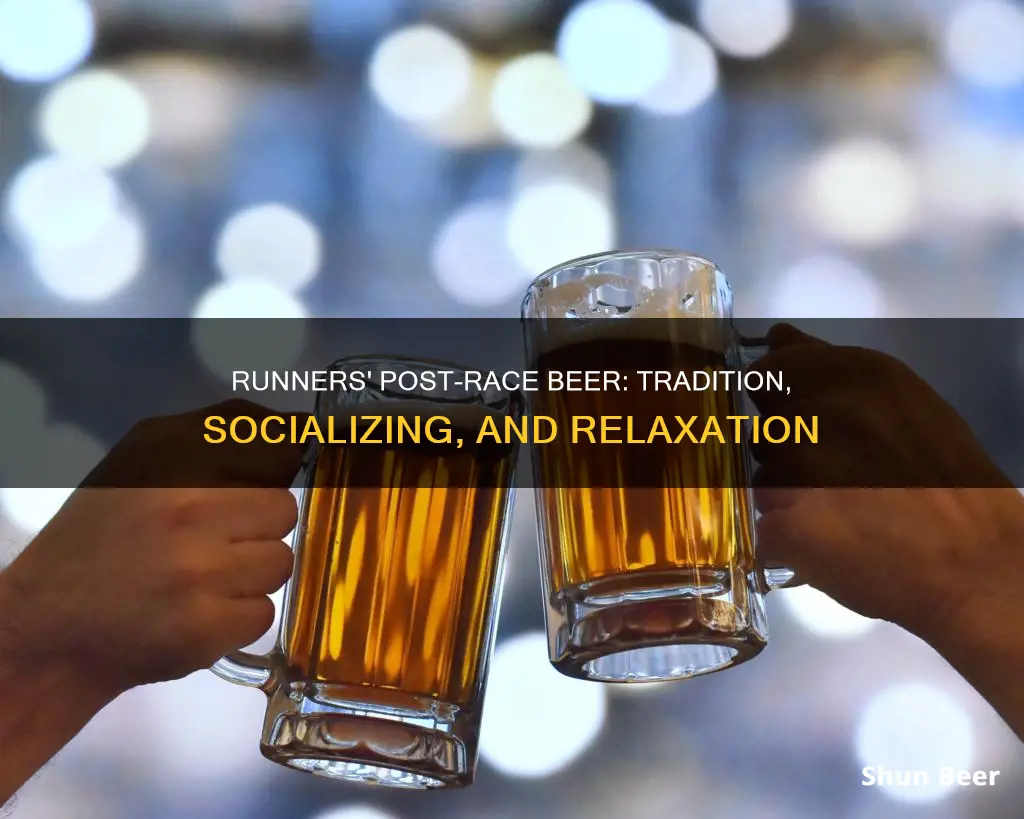
Beer and running have long been intertwined, with many runners enjoying a cold beer after a race. But why do they do it?
Well, for one, it's a great way to relax and unwind after a tough workout. Beer is also a source of carbohydrates, which are important for distance runners to replenish their glycogen stores. In addition, beer contains vitamins, minerals, antioxidants, polyphenols, and electrolytes, all of which can aid in recovery. However, it's important to note that alcohol can impede recovery and contribute to dehydration, especially if not consumed in moderation.
So, while runners may enjoy a beer or two after a race, it's crucial to prioritize rehydration and proper nutrition first to ensure optimal recovery.
| Characteristics | Values |
|---|---|
| Carbohydrates | Beer contains carbohydrates in varying quantities. The higher the ABV, the more carbohydrates a beer contains. |
| Electrolytes | Beer provides some electrolytes, which are included in regular sports drinks and recommended by sports nutritionists as part of a rehydration beverage. |
| Vitamins and minerals | Beer contains vitamins and minerals, such as B vitamins and electrolytes like potassium, calcium, magnesium, and trace amounts of iron, phosphorus, zinc, and selenium. |
| Protein | Beer contains a small amount of protein. |
| Antioxidants | Beer contains antioxidants, which can help prevent heart disease. |
| Polyphenols | Beer contains polyphenols, which have anti-inflammatory properties and can help prevent colds and viruses. |
| Diuretic | Beer is considered a diuretic, which can contribute to dehydration. |
| Rehydration | Drinking a moderate alcoholic beer (roughly 4.5% ABV) with water after a workout did not negatively impact rehydration compared to drinking only water, according to a 2015 study. |
| Glycogen synthesis | Alcohol blocks glycogen synthesis, which can interfere with energy replacement after endurance exercise. |
| Muscle protein synthesis | Alcohol intake can impair muscle protein synthesis, which is necessary for repairing and strengthening damaged muscle fibers after exercise. |
| Hormone production | Alcohol can block the production of anabolic hormones such as human growth hormone and testosterone, which are important for muscle growth and fitness gains. |
What You'll Learn
- Beer contains vitamins, minerals, antioxidants, polyphenols, electrolytes, carbs and protein
- Beer can reduce inflammation and the risk of upper respiratory infections
- Beer can help prevent heart disease and lower cholesterol
- Beer can improve sleep and reduce stress
- Beer can be a good pre-run drink to balance electrolytes

Beer contains vitamins, minerals, antioxidants, polyphenols, electrolytes, carbs and protein
Beer is a popular post-race drink for runners, but is it a good recovery drink?
Beer contains vitamins, minerals, antioxidants, polyphenols, electrolytes, carbs, and protein. While these are all beneficial to health and recovery, the amount present in beer is small, and the benefits are outweighed by the negative consequences of consuming alcohol.
Beer is mostly water, so it aids hydration, which is important for runners, especially after a long race. Beer also contains carbohydrates, which are important for distance runners to replenish depleted glycogen stores. However, alcohol can block glycogen synthesis, so the alcohol content of beer may undo the benefits of the carbohydrate intake.
Beer also provides some electrolytes, which are recommended by sports nutritionists as part of a rehydration beverage or post-run snack. However, alcohol is a diuretic, so it is not the best hydration fluid. In addition, the higher the percentage of alcohol by volume (ABV), the more dehydrating the beer will be.
Beer also contains B vitamins, including niacin, riboflavin, folate, vitamin B12, and thiamine. These vitamins have various health benefits, including improving heart health and reducing the risk of heart disease. Beer also contains small amounts of electrolytes like potassium, calcium, magnesium, and trace amounts of minerals like iron, phosphorus, zinc, and selenium.
In addition to the vitamins, minerals, and electrolytes, beer also contains polyphenols, which have been found to help reduce inflammation and alleviate stress on the body. This can help prevent illnesses like colds and viruses.
While beer does contain some beneficial nutrients, it is important to note that the amount of these nutrients is small, and the negative effects of alcohol consumption can outweigh the benefits. Heavy alcohol intake after running can be detrimental to recovery and overall health. It can impair muscle protein synthesis, compromise recovery by affecting the metabolism of carbohydrates and proteins, and block the production of anabolic hormones.
So, while beer does contain vitamins, minerals, antioxidants, polyphenols, electrolytes, carbs, and protein, the amounts are small, and the negative consequences of alcohol consumption can outweigh the benefits. It is important for runners to prioritize rehydration and recovery with water and a balanced meal before enjoying a beer to celebrate their achievement.
Mixing Beer and Cough Syrup: What You Should Know
You may want to see also

Beer can reduce inflammation and the risk of upper respiratory infections
Beer has been shown to have anti-inflammatory properties and can reduce the risk of upper respiratory infections. A 2011 study from the Technical University of Munich found that runners who drank several pints of non-alcoholic beer before and after a marathon experienced less inflammation and fewer upper respiratory infections than those who drank a placebo. A similar 2012 study published in Medicine and Science in Sports and Exercise found that when marathon runners drank 1.5 litres of non-alcoholic beer a day, they had a reduced risk of upper respiratory infections and their white blood cell activity decreased by 20%, indicating lower inflammation.
These health benefits are attributed to the presence of polyphenols in beer, which have been found to reduce inflammation and alleviate stress on the body, thereby preventing illnesses. In addition, hops, one of the base ingredients in beer, contains a polyphenol called xanthohumol, which has been specifically linked to reducing inflammation.
However, it is important to note that beer is not the most optimal recovery drink for runners. While beer does contain some vitamins, minerals, antioxidants, electrolytes, carbohydrates, and protein, it is not a sufficient source of these nutrients for post-workout recovery. Heavy alcohol intake after running can negatively impact muscle protein synthesis, compromise recovery, block the production of anabolic hormones, and contribute to dehydration. Therefore, it is recommended to prioritise rehydration and refuelling with adequate protein and carbohydrates after a run, and then enjoy a beer for relaxation and enjoyment.
Invisalign and Beer: What's the Deal?
You may want to see also

Beer can help prevent heart disease and lower cholesterol
Beer has been shown to have some health benefits when consumed in moderation (one drink per day for women and two drinks per day for men). These benefits include the ability to help prevent disease, reduce inflammation, and lower cholesterol.
Beer contains polyphenols, which have been found to help reduce inflammation and alleviate stress placed on the body by exercise. A 2012 study published in Medicine and Science in Sports and Exercise found that when marathon runners drank 1.5 litres of non-alcoholic beer a day, they had a decreased risk of upper respiratory infections. The researchers also found that the runners' white blood cell activity went down by 20%, suggesting decreased inflammation.
Beer can also help to keep your "ticker ticking". Studies suggest that the cardiovascular benefits of wine are also found in beer and spirits. Therefore, moderate consumption of any alcoholic drink can help to lower your risk of cardiovascular disease. However, too much of any alcoholic beverage can increase your chances of heart disease, so it is best to stick to one a day to maximise your benefits.
Beer also contains antioxidants, which can help to prevent heart disease. A 2016 review of research published in the journal Nutrition, Metabolism & Cardiovascular Diseases found that low-to-moderate beer consumption (up to one drink a day for women and up to two for men) reduced the risk of cardiovascular disease.
Left-Out Beer: Drink or Ditch?
You may want to see also

Beer can improve sleep and reduce stress
While beer does contain vitamins, minerals, antioxidants, polyphenols, electrolytes, carbs, and protein, it is not the best option for rehydration after a long run. Beer is a diuretic, which means it can be dehydrating, especially those with a higher alcohol content.
However, a 2015 study published in the Journal of the International Society of Sports Nutrition found that drinking a moderate alcoholic beer (around 4.5% ABV) with water after a workout did not negatively impact rehydration compared to drinking only water.
Beer can also help reduce stress and tension in the body, which can be beneficial after a long run. A 2009 study by Dr. Johannes Scherr found that drinking non-alcoholic beer reduced inflammation and the risk of colds and viruses. The polyphenols in beer were found to alleviate stress and tension in the body, which can help prevent illnesses.
Additionally, a study published in the journal Nutrients found that drinking non-alcoholic beer before a run helped maintain electrolyte balance better than drinking water or alcoholic beer. This is due to the high sodium content in non-alcoholic beer.
So, while beer may not be the best option for rehydration, it can offer some benefits for runners, such as stress relief and improved sleep. However, it is important to drink in moderation and pair it with water to avoid dehydration.
Drinking Beer in Venice: What's Allowed in Public?
You may want to see also

Beer can be a good pre-run drink to balance electrolytes
It's important to note that the study in question tested the effects of beer consumption before running, not after. Additionally, the participants in the study performed steady-state exercise (nonstop running) on a treadmill, which is different from the intermittent, high-intensity bouts of activity performed by soccer players, for example. However, long runs are also steady-state exercises, suggesting that non-alcoholic beer can be particularly effective for hydration before a run.
While beer has been shown to have some health benefits when consumed in moderation, it's important to remember that it is not the most optimal drink for hydration or recovery. Alcoholic beverages are dehydrating and can interfere with glycogen replacement, which is crucial for runners. Therefore, it is recommended to prioritise rehydration and recovery fuel after a run, and then enjoy a beer as a way to relax and celebrate.
Beer and Blood Work: What's the Connection?
You may want to see also
Frequently asked questions
Beer is a popular post-race drink for runners as it is said to have several health benefits when consumed in moderation, such as reducing inflammation and the risk of cardiovascular disease. Beer also contains carbohydrates, which are important for runners' recovery.
While beer does contain some vitamins, minerals, antioxidants, and electrolytes, it is not the best recovery drink. Alcohol can impede muscle protein synthesis and block the production of anabolic hormones. Therefore, it is important for runners to rehydrate and refuel with adequate protein and carbohydrates before drinking beer.
Yes, a 2012 study found that marathon runners who drank 1.5 liters of non-alcoholic beer per day had a decreased risk of upper respiratory infections and reduced inflammation. Another study found that runners who drank non-alcoholic beer before running maintained electrolyte homeostasis better than those who drank water.
Yes, other recovery drinks such as chocolate milk and sports drinks with glucose and electrolytes can also help with rehydration and replenishing electrolytes and glycogen.
It is generally recommended that women have no more than one drink per day and men have no more than two drinks per day. Excessive alcohol consumption can increase the risk of heart disease and dehydration.







